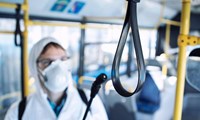
Recently, with IRU, Polis, EuroCities and CER, the International Association of Public Transport (UITP) wrote to the European institutions with an Open Letter to the President of the European Commission, Ursula von der Leyen, President of the European Council, Charles Michel, and David Maria Sassoli, President of the European Parliament, to call for the ongoing support of the European public transport sector now, and in the times that lie ahead.
As an international association, UITP has now also teamed up with the International Transport Workers’ Federation (ITF), the International Union of Railways (UIC) and United Cities and Local Governments (UCLG) to call for the continuity of passenger transport services around the world during these unprecedented times and beyond.
“As the world lives through the coronavirus pandemic, maintaining a specific service within our sector is vital,” it wrote in a statement.
“With key sector workers in our cities relying on their local mobility options we must always advocate for the basic continuity and survival of our public transport services."
“In order to ensure the continuity of services, the competent authorities have to guarantee the availability of the relevant sanitary equipment and products to public transport and local mobility operators to protect the health and safety of their employees, as well as their passengers.”
UITP stated that it is committed to optimise the exchange of good practices, started in January 2020, and continue to jointly build expertise within the community of mobility providers. Alongside its fellow associations, it said it will also ensure the continuity of service and limit any likely consequences for the various stakeholders in the local passenger transport sector.
“We remain ready to contribute to the future ambitious environmental objectives as these are truly exceptional circumstances… action and collaboration are required to make sure that the public transport sector survives and thrives,” the statement concluded.
Examples of good practice measures noted within the joint statement include:
- Ensure that all workers receive the latest and most accurate information about COVID-19, including ways to limit/avoid transmission
- Provide staff, in all occupational groups, with adequate Personal Protective Equipment (PPE), including gloves, masks and hand sanitising products and other appropriate means to limit the spread of the virus, taking into account the availability of the local facilities
- Regular deep cleaning and disinfection of public transport vehicles/workplaces/stations and assets touched by public transport users (such as ticketing devices, poles, seats etc) and make available disinfectant dispensers for passengers
- Limit the interactions of drivers and other occupations with passengers (for example no cash ticket sales onboard, allowing rear-door boarding only) in line with social distancing standards
- Adapt the level of service according to the reduction of travel demand to ensure service continuity and to comply with decisions taken by public authorities (e.g. night services and school services are suspended in some cities, some networks are following weekend or school holidays timetables as agreed with trade unions)
- Provide dedicated services to healthcare personnel and any other category of personnel falling under essential services.
About Intelligent Transport
 Serving the transport industry for more than 15 years, Intelligent Transport is the leading source for information in the urban public transport sector. Covering all the new technologies and developments within this vitally important sector, Intelligent Transport provides high-quality analysis across our core topics: Smart Cities, Digitalisation, Intermodality, Ticketing and Payments, Safety and Security, The Passenger, The Fleet, Business Models and Regulation and Legislation.
Serving the transport industry for more than 15 years, Intelligent Transport is the leading source for information in the urban public transport sector. Covering all the new technologies and developments within this vitally important sector, Intelligent Transport provides high-quality analysis across our core topics: Smart Cities, Digitalisation, Intermodality, Ticketing and Payments, Safety and Security, The Passenger, The Fleet, Business Models and Regulation and Legislation.




Comments
There are no comments yet for this item
Join the discussion